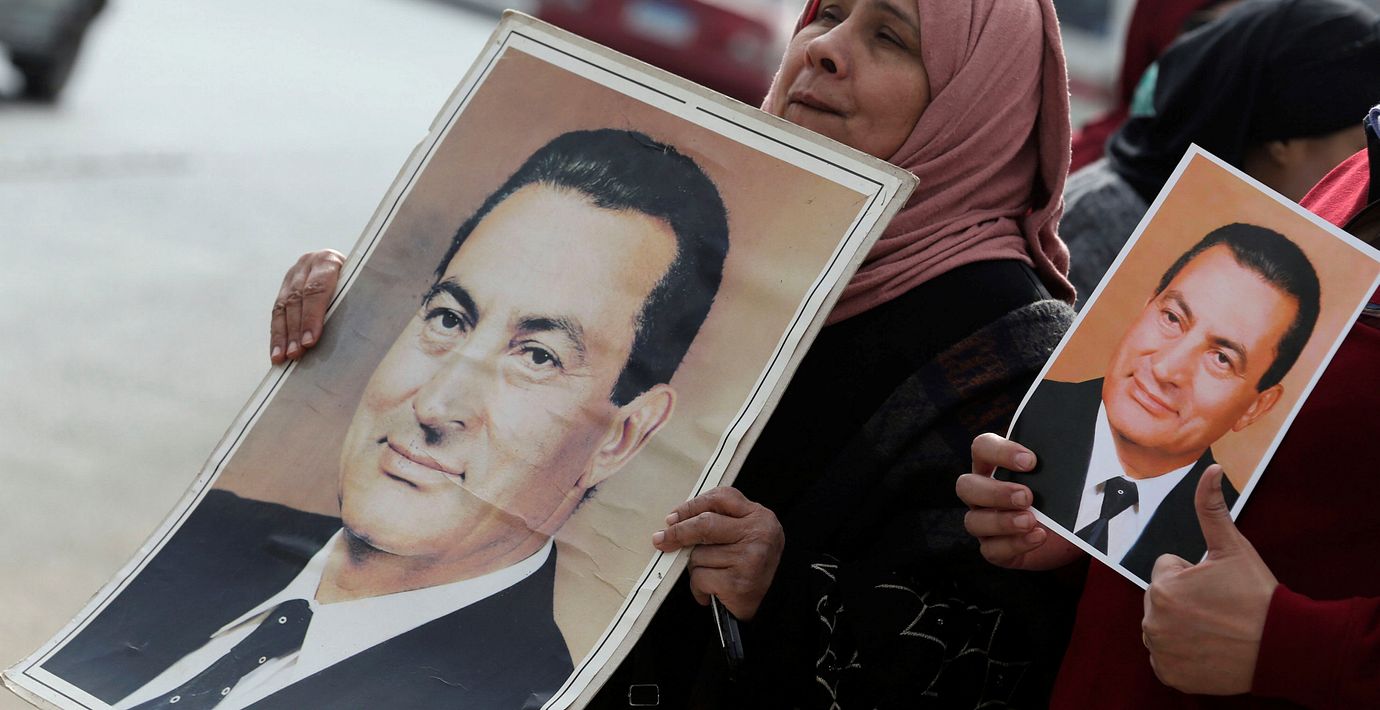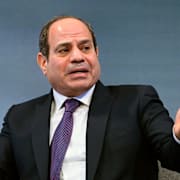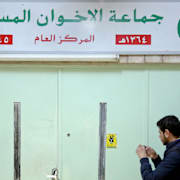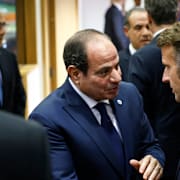
Egyptisk åklagare tillåter att Mubarak släpps
En egyptisk åklagare tillåter den före detta presidenten Hosni Mubarak att gå fri. Det uppger hans advokat enligt AFP.
I början av mars friades ex-presidenten slutligt från ansvar för att hundratals demonstranter dödades i samband med protesterna i landet 2011.
– Han kan åka hem när läkarna säger att han kan det, säger Farid al-Deeb men tillägger att 88-årige Mubarak inte tillåts lämna landet på grund av en pågående korruptionsutredning.
bakgrund
Hosni Mubarak
Wikipedia (sv)
Muhammed Hosni Said Mubarak (arabiska: محمد حسني السيد مبارك, Muḥammad Ḥusnī Sayyid Mubārak), född 4 maj 1928 i Al-Minufiyya-guvernatet, var Egyptens president från 14 oktober 1981 fram till fredagen 11 februari 2011 då han lämnade presidentposten efter massiva folkliga protester och hård press från den egyptiska militären.
Mubarak dömdes till livstids fängelse den 2 juni 2012.
bakgrund
Egyptiska revolutionen 2011
Wikipedia (en)
The Egyptian revolution of 2011, locally known as the January 25 Revolution (Egyptian Arabic: ثورة 25 يناير; Thawret 25 yanāyir), began on 25 January 2011 and took place across all of Egypt. The date was set by various youth groups to coincide with the annual Egyptian "police day" as a statement against increasing police brutality during the last few years of Mubarak's presidency. It consisted of demonstrations, marches, occupations of plazas, non-violent civil resistance, acts of civil disobedience and strikes. Millions of protesters from a range of socio-economic and religious backgrounds demanded the overthrow of Egyptian President Hosni Mubarak. The revolution started by calls for protests from online youth groups. Initially these included liberal, anti-capitalist, nationalist, and feminist elements, but they finally included Islamist elements as well. Violent clashes between security forces and protesters resulted in at least 846 people killed and over 6,000 injured. Protesters retaliated by burning over 90 police stations across the country. The protests took place in Cairo, Alexandria and all major cities across the nation.
The Egyptian protesters' grievances focused on legal and political issues, including police brutality, state-of-emergency laws, lack of free elections and freedom of speech, corruption, and economic issues including high unemployment, food-price inflation and low wages. The protesters' primary demands were the end of the Mubarak regime and emergency law, freedom, justice, a responsive non-military government and a voice in managing Egypt's resources. Strikes by labour unions added to the pressure on government officials.
During the uprising, the capital Cairo was described as "a war zone" and the port city of Suez saw frequent violent clashes. Protesters defied a government-imposed curfew, which was impossible to enforce by the police and military. Egypt's Central Security Forces, loyal to Mubarak, were gradually replaced by military troops. In the chaos, there was some looting by gangs which was instigated (according to opposition sources) by plainclothes police officers. In response, watch groups were organized by civilians to protect neighbourhoods.
International reaction has varied, with most Western nations condoning peaceful protests but concerned about the stability of Egypt and the region. The Egyptian and Tunisian revolutions have influenced demonstrations in other Arab countries, including Yemen, Bahrain, Jordan, Syria and Libya.
Mubarak dissolved his government, appointing former head of the Egyptian General Intelligence Directorate Omar Suleiman vice-president in an attempt to quell dissent. Mubarak asked aviation minister and former chief of Egypt's air force Ahmed Shafik (who ran for presidency later) to form a new government. Mohamed ElBaradei became a major opposition figure, with all major opposition groups supporting his role as negotiator for a transitional unity government. In response to mounting pressure, Mubarak in another attempt to contain the crisis announced he did not intend to seek re-election in September.
On 11 February 2011 Vice President Omar Suleiman announced that Mubarak would resign as president, turning power over to the Supreme Council of the Armed Forces (SCAF). The military junta, headed by effective head of state Mohamed Hussein Tantawi, announced on 13 February that the constitution would be suspended, both houses of parliament dissolved and the military would rule for six months (until elections could be held). The previous cabinet, including Prime Minister Ahmed Shafik, would serve as a caretaker government until a new one was formed. Shafik, seen by the masses as another Mubarak figure, resigned on 3 March, a day before major protests to force him to step down were planned, and was replaced by former transport minister Essam Sharaf. On 24 May 2011, Mubarak was ordered to stand trial on charges of premeditated murder of peaceful protesters and, if convicted, could face the death penalty. On 2 June 2012 Mubarak was found guilty of complicity in the murder of protesters and sentenced to life imprisonment, but the sentence was overturned on appeal and a retrial ordered. A number of protesters, upset that others tried with Mubarak (including his two sons) were acquitted, took to the streets. Mubarak was eventually cleared of all charges on 29 November 2014, although Egypt's prosecutor general announced he would appeal the verdict.
After the revolution against Mubarak and a period of rule by the Supreme Council of the Armed Forces, the Muslim Brotherhood took power in Egypt through a series of popular elections, with Egyptians electing Islamist Mohamed Morsi to the presidency in June 2012. However, Morsi's government encountered fierce opposition after his attempt to pass an Islamist constitution that followed extreme Islamist views, Morsi's attempted also to change laws granting himself unparalleled powers like no other president in Egyptian history. It sparked general outrage from secularists and members of the military, and mass protests broke out against his rule in June 2013. On 3 July 2013, Morsi was deposed by a coup d'état led by the minister of defense, General Abdel Fattah El-Sisi, who became Egypt's de facto strongman and eventually became Egypt's president by popular election in 2014.
Omni är politiskt obundna och oberoende. Vi strävar efter att ge fler perspektiv på nyheterna. Har du frågor eller synpunkter kring vår rapportering? Kontakta redaktionen



